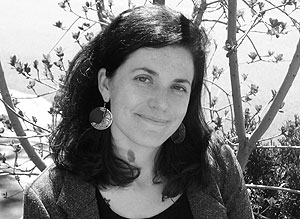Field Guide for the “White” Naturalist
or: The Trees Speak a History I Did Not Know
Instructions with a Disclaimer: If you bring this guide into the field, keep in mind that it is best read with a wariness of white spaces, identifications, and curations. Carry a pen and a pair of scissors; you may have to fill it in and undercut its whiteness as you read. Do not trust what you think you know.
Lapdog (canis)
Description: known to runaway slaves as a bloodhound or savage dog; a tracker of skin oils & cells; trained to fight until the death; slaves traveled through muddy water or wore rabbit grease on their feet to throw the dogs off their scent
what did the dogs know?
what omissions
what skins
what odor of terror & rabbit,
what curse
what coercion
Migrating birds (migratus)
Description: a cue for flying north; a summoning
what does it mean to take flight
your heart a bird
smacking
against your rib cage?
When from the sky,
a sign
Oak Tree (quercus)
Description-America’s national tree; wholesome and strong, likes full sun; in the night: a hanging tree
to set out in the night
Ocean (oceanus)
Description-a middle place; a passage; “there was hardly room…some went mad of thirst and tore their flesh/ and sucked the blood…”
with such thirst
Pine (pinus)
Description-a medicine used by slaves; an antiseptic; “Fer de lil’ chilluns and babies [grannies] would take and chew up pine needles and den spit it in lil’ chilluns mouths and make dem swallow”
babies & grannies
Riverbank (ripam fluminis)
Description: a road north; as in salvation
followed
the river
Sage (Salvia officinalis)
Description- a medicine used by slaves; a balm for fever and chills; antioxidant; taste: bitter, earthy; from the Latin word “salvare,” meaning to be saved
saved themselves
Salt (Salis)
Description: a preserver; a corroder; as in seawater, a body of water
preserved
their bodies
Stars (Stellae)
Description: an escape map; as in follow the gourd, go underground, seek out the call of the “owl”
sought out
a voice
from the dead calm
a hoot
a beckoning
Can you trust with your life
a who
in a moonless wood?
Note: “Field Guide for the ‘White’ Naturalist:” The identifications are predicated on my readings of Camille Dungy’s Black Nature: Four Centuries of African American Nature Poetry, Herbert C. Covey’s African American Slave Medicine: Herbal and Non-Herbal Treatments and Robert Hayden’s “Middle Passage.”
Ornithology 103
We came to study the seagulls.
When our field trip to the sea
didn’t pan out (budget cuts), we caravanned
to the dump, fording through oceans
of crud to see the gulls in their habitat.
Necklaced with binoculars, we monitored
their behavior, scribbled field notes.
It’s true: they’ve learned to slam and shatter
tinned fish like clams against the rocks
and comb through swells of metals,
denuded Christmas trees, tables protruding
like pectoral fins, and even drowning mannequins
for stray crumbs, dabs of meat,
and—best of all—deshelled crabmeat.
When our professor, spying a herring gull,
wandered off, we ditched our binoculars
and played king of the trash heap,
rapiering freshmen with umbrellas. Too late
we turned when the gulls
unburied the creature, when it coughed up
bright ribbons of plastics globbed
with blood; when it shimmied on a belly
bloated by improbable hungers towards us;
when it dressed itself with fruit peels,
a hooked fish, a garnish of glass,
and even its own intestines, a map
looping back to us. Too late
I turned when it curled
eel-slick against me
as if I were its father.

